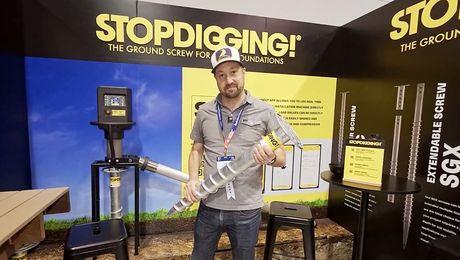I am building a woodworking shop. Need recomendations for a heating system. I am considering baseboard electric heat as electricity is my only energy source.
Discussion Forum
Discussion Forum
Up Next
Video Shorts
Featured Story

Discover a concrete-free foundation option that doesn't require any digging.
Highlights
"I have learned so much thanks to the searchable articles on the FHB website. I can confidently say that I expect to be a life-long subscriber." - M.K.
Fine Homebuilding Magazine
- Home Group
- Antique Trader
- Arts & Crafts Homes
- Bank Note Reporter
- Cabin Life
- Cuisine at Home
- Fine Gardening
- Fine Woodworking
- Green Building Advisor
- Garden Gate
- Horticulture
- Keep Craft Alive
- Log Home Living
- Military Trader/Vehicles
- Numismatic News
- Numismaster
- Old Cars Weekly
- Old House Journal
- Period Homes
- Popular Woodworking
- Script
- ShopNotes
- Sports Collectors Digest
- Threads
- Timber Home Living
- Traditional Building
- Woodsmith
- World Coin News
- Writer's Digest


















Replies
thats what i did. i love it. no complaints at all. I insulated well, and i didnt notice an increase in my electric bill.
What do you do about all the sawdust building up on the heating elements? Isn't it a fire hazard and a source of bad smells?
the heaters i have in my shop are accessable, so i just blow the dust off them with compressed air. ive never smelt anything like burning from them. the key is to get a good thermostat wired to all of them and to get more heaters than you will need. that way all of the heaters will work at a lower temperater rather than ony a few heaters working at full power to keep the space warm. I also turn mine down at night.
i didnt notice an increase in my electric bill
Did you look? I like electric heat, but it's notoriously expensive to run.Any jackass can kick down a barn, but it takes a carpenter to build one.
i realize, but with a relatively small, and well insulated shop, it is a non issue.
And, yes of course i looked.
It can be a viable alternative. I'm planning to install electric heat in my new home, but I will also have substantial solar gain and a wood stove. Part of the elec system will be a thermal storage heater.Any jackass can kick down a barn, but it takes a carpenter to build one.
Thanks Gecko,
I used baseboard electric in a home once and thaought it was great. Had a concern about the fire hazard but you answered that in on of yor responses. I think I have decided to go with it.
What brand of electric baseboard heaters did you buy And about how much did they cost. I need some
i dont remember what brand, but i got them at The Building Box (basically a Canadian Home Depot) i think i paid about $200 Canadian for four of the heaters and a nice thermostat. Be sure to ask at the store for a thermostat that will work with baseboard heaters because you need to run the line through it.
Thanks for the reply. I think I saw some at Home depot . I really started thinking about these things when someone said he heats with them with no increase in his electric bill, WOW! gotta have these.
no NOTICEABLE increase. and I should mention my shop is very well insulated, including the floor and it is almost air tight. when I say airtight I mean my ears pop when I open the door.
where are you? if near Seattle, I'll give you some free.
I live in Cumming, Georgia just north of Atlanta (about 5 minutes past breathing hard.) Thanks for the heaters but I can't come get them . My Learjet has the front end up on concrete blocks behind my doublewide.
If money were no object, radiant floor heat would be the best in my opinion. There's no fins or filters to clean, no fire hazard, nothing to hinder tool placement. If you burn a cut or use some solvent and want to vent the room you can open the doors, let the fresh air in, and a few minutes after the doors are closed the shop is warm again. You could have a small propane or oil fired system. It's certainly a lot more up front cost than electric heat, though.
the problem with open flame type heat is the potential for explosion. even if you dont use spray lacquer or any other potential fire hazard, it would be nice to at least have the option to.
Thanks WAYNEL5,
I had considered radient heat until I talked to one of the manufacturers. As I am in the shop only occasionally, the time to get the shop back up to temp for only short periods appeared to void the other benefits. I may wish I had gone with it anyway but I have already poured the foundation.
I have it in my shop. When installed in a concrete slab it definitely takes a long time to come up to temperature if you kick up the thermostat 10°. Like all day. And, it overshoots 2 or 3° with basic controls, though if it were installed in a home better controls would be installed that supposedly eliminate the overshoot.
Good luck. Enjoy your new shop!
Are you referring to hot water in tubes in the slab?
What kind on control do you have?
I'm set up for this with the tubes in the slab, and a slab sensor that directs a relay to turn the circulator pump on. I'm just now putting all the pieces together and need to know some "words from the wise" on bringing the slab up to temperature and avoid overshoot.
The relay is designed to respond to the in-slab sensor's call for heat. There is a huge temperature range to work in, and a delta setting for kick on and kick off. It's going to take some experimentation to get this right, so I'm interested in whatever baseline numbers I should use to cut down on experimental frustrations and time.
My system does not have a slab sensor, just a thermostat on the wall. (It is a system with PEX tubing in a concrete slab.) When I casually mentioned the overshooting to the installer a year later he told me he expected it. Since it was a shop he quoted the lower cost control system, which is essentially a thermostat on the wall. If it was a living space he would have quoted a more appropriate control system. I did not ask what that would have been, however.
The way I live with it is to set the thermostat 3° lower when I jack up the temperature, then reset it the next day. For example, if I've been away and the shop is 60° and I want it 70, I set the thermostat to 67. The next day the shop is close to 70, and I just reset the thermostat to 70 and it holds it well.
Interesting. I'm hoping that the slab will maintain a fairly constant 65 degrees with a slab temp of 70 degrees.
This building has R25 walls, R38 ceiling, two 8' insulated garage doors, and a an entrance door...no windows yet.
Any one out there have some baseline numbers to use to set up?
Actually that is the perfect application for Infra-red type of radiant head.
where you have overhead radiant heaters.
Can you recommend a brand and/or source. I've seen the IR heaters in large shops but know very little about them. Is there a fire hadard with flammable fumes or liquids?
Do a google on Detroit Radiant.
I forgot what there brand name is.
They make sealed combustion chamber units. Where I first ran across them was in aircraft hangers.
Now those are gas (LP).
But there are electric infra-red units. But the ones that I have seen advertisted are small shop size units, which might be OK for you.
Thanks
IMHO
No to Electric baseboard (to expensive to heat with Electric)
No to Infrared radiant (Last time I looked at them, they put out a lot of heat next to the fixture) they need very high ceilings to work efficiently.
Yes to a unit heater hanging from the ceiling. I have a 30-70 thermastat on mine. Keep it on 40-50 when I'm not working in the shop but crank it up when I am. Works great.
You get out of life what you put into it......minus taxes.
Marv
The Detroit Radaint list ####series of gas infra-red that are speced for lower ceiling heights like in garage or shop.
Don't know about the electric.
You are right the common ones that are used in hangers and warehouses need high ceiling.
Here in south jersey electric is exspensive. I put in a natural gas heater. Is propane available in your area? A vented propane furnace might be an alternate.
mike